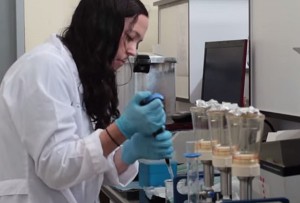UNC Anthrooplogy PhD candidate and graduate associate in the Center for Galapagos Studies, Kelly Houck, has received a Doctoral Dissertation Research Improvement grant to support her research in the Galapagos.
Houck is a biological anthropologist specializing in human biology. Her work focuses on the health impacts of environmental and social changes among populations undergoing economic development, urbanization, and population growth. Her doctoral advisor is Dr. Amanda Thompson.

Frequent intestinal infections due to poor water quality and inadequate sanitation during childhood often result in chronic malnutrition and linear growth restrictions. The Galapagos, like many developing areas, are now undergoing diet and disease transitions, with a shift from frequent malnutrition and infectious disease to increasing overnutrition, with calorically-dense, high-fat, low-fiber diets, and higher rates of overweight and obesity. The impact of this dual burden of infection and overnutrition on childhood intestinal health and immune function remains unknown.
Houck’s research draws on the emerging field of study focusing on gut microbiota, the beneficial bacterial colonies responsible for intestinal barrier function, digestion of dietary fiber and immune health (inflammatory regulation), to examine the impact of pathogenic and dietary factors on the relationship between childhood gut immune health, growth and obesity.
The Galapagos Islands are an important setting for this research as children experience both high infection rates due to the lack of clean water and overnutrition, likely due to the reliance on processed foods shipped from the mainland.
The dissertation grant runs through 2015 and will support her fieldwork and residence at the Galapagos Science Center on San Cristobal Island.
